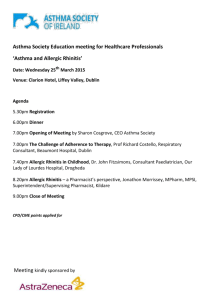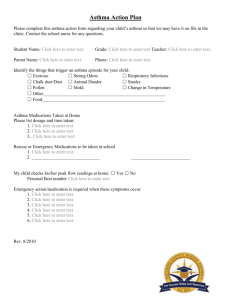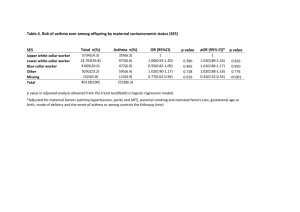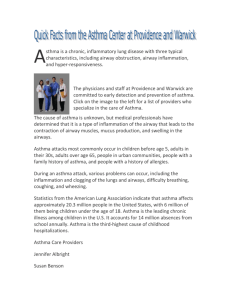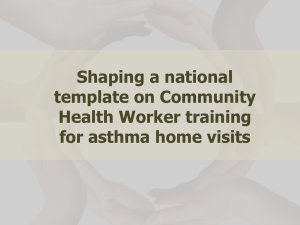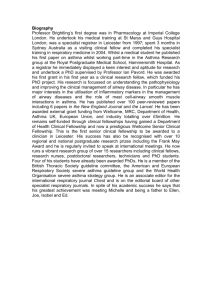Press release
advertisement
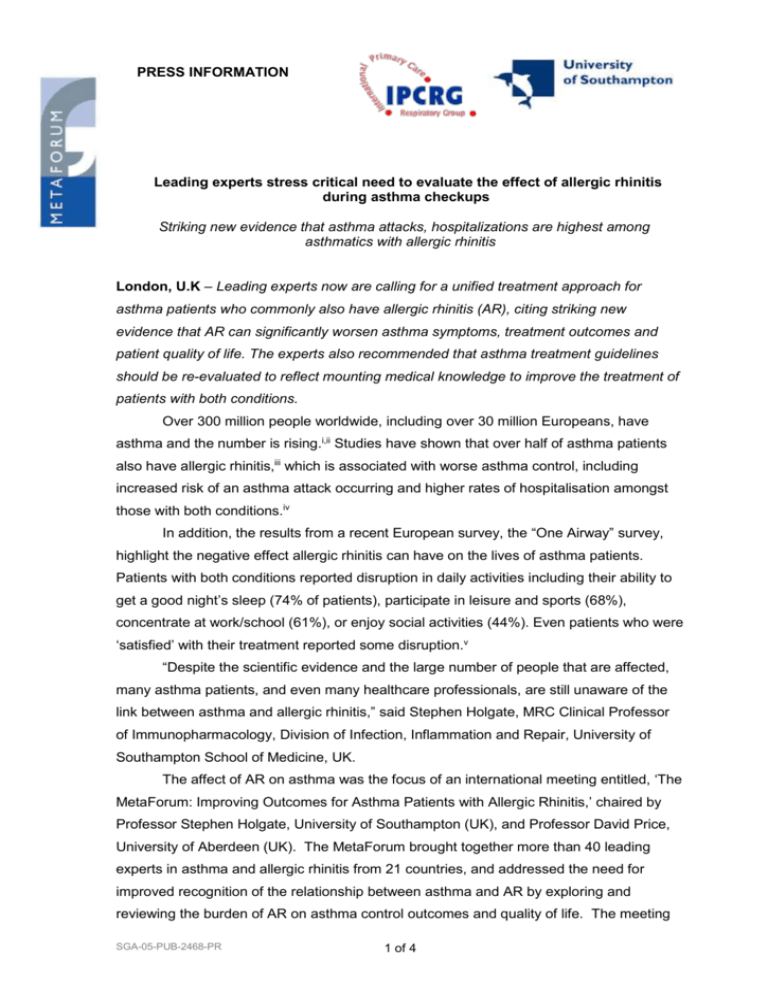
PRESS INFORMATION Leading experts stress critical need to evaluate the effect of allergic rhinitis during asthma checkups Striking new evidence that asthma attacks, hospitalizations are highest among asthmatics with allergic rhinitis London, U.K – Leading experts now are calling for a unified treatment approach for asthma patients who commonly also have allergic rhinitis (AR), citing striking new evidence that AR can significantly worsen asthma symptoms, treatment outcomes and patient quality of life. The experts also recommended that asthma treatment guidelines should be re-evaluated to reflect mounting medical knowledge to improve the treatment of patients with both conditions. Over 300 million people worldwide, including over 30 million Europeans, have asthma and the number is rising.i,ii Studies have shown that over half of asthma patients also have allergic rhinitis,iii which is associated with worse asthma control, including increased risk of an asthma attack occurring and higher rates of hospitalisation amongst those with both conditions.iv In addition, the results from a recent European survey, the “One Airway” survey, highlight the negative effect allergic rhinitis can have on the lives of asthma patients. Patients with both conditions reported disruption in daily activities including their ability to get a good night’s sleep (74% of patients), participate in leisure and sports (68%), concentrate at work/school (61%), or enjoy social activities (44%). Even patients who were ‘satisfied’ with their treatment reported some disruption.v “Despite the scientific evidence and the large number of people that are affected, many asthma patients, and even many healthcare professionals, are still unaware of the link between asthma and allergic rhinitis,” said Stephen Holgate, MRC Clinical Professor of Immunopharmacology, Division of Infection, Inflammation and Repair, University of Southampton School of Medicine, UK. The affect of AR on asthma was the focus of an international meeting entitled, ‘The MetaForum: Improving Outcomes for Asthma Patients with Allergic Rhinitis,’ chaired by Professor Stephen Holgate, University of Southampton (UK), and Professor David Price, University of Aberdeen (UK). The MetaForum brought together more than 40 leading experts in asthma and allergic rhinitis from 21 countries, and addressed the need for improved recognition of the relationship between asthma and AR by exploring and reviewing the burden of AR on asthma control outcomes and quality of life. The meeting SGA-05-PUB-2468-PR 1 of 4 was supported by an educational grant by Merck & Co., Inc of Whitehouse Station, NJ, USA. The link between the two conditions is highlighted by the ‘one airway, one disease’ concept, which shows that the upper and lower airways share a common pathophysiology, and that asthma and allergic rhinitis are manifestations of the same inflammatory airway disease. The link has led many to physicians believe that control of airway inflammation is critical and that the two conditions ideally should be treated together. However, some asthma guidelines do not sufficiently address the impact of allergic rhinitis on asthma outcomes. Consensus of the MetaForum Consensus of the experts at the MetaForum reflected five major recommendations by the experts: 1. Physicians and patients need to better understand and recognise the impact allergic rhinitis has on asthma symptoms, outcomes and quality of life 2. Treatment guidelines should be re-evaluated to ensure they reflect the latest medical knowledge 3. All asthma patients should be evaluated for symptoms of allergic rhinitis, and vice versa 4. Asthma and allergic rhinitis should be managed concomitantly, addressing the ‘one airway’ concept 5. Patients and all healthcare professionals need to be educated on the combined management of asthma and allergic rhinitis “The co-morbid and linked nature of these conditions highlights a clear need for a combined approach to treatment. Some guidelines, such as those produced by ARIA1 and the IPCRG in conjunction with other similar organisations,2 reflect this need; however, many other asthma guidelines barely acknowledge this important issue,” concluded David Price, General Practice Airways Group Professor of Primary Care Respiratory Medicine, University of Aberdeen, UK. “Reflecting the compelling evidence on the adverse relationship between AR and asthma, all guidelines should now encourage healthcare professionals to ask patients about severity and impact of allergic rhinitis, routinely, as part of their asthma assessment and when making treatment choices.” 1 2 Allergic Rhinitis and its Impact on Asthma International Primary Care Respiratory Group SGA-05-PUB-2468-PR 2 of 4 About the MetaForum The MetaForum: Improving Outcomes for Asthma Patients with Allergic Rhinitis meeting took place on 13 December 2004 in London, UK, following an initial meeting in April 2004 on improving asthma care, which highlighted the need to recognise the relationship between asthma and allergic rhinitis. The December meeting included presentations from a leading panel of experts on how allergic rhinitis can impact on asthma patients’ quality of life and treatment outcomes, airway inflammation and the ‘one airway’ concept, and current asthma guidelines. Following the presentations, participant and panelists participated in an active discussion to reach consensus on the areas for action and next steps required to improve outcomes for asthma patients with allergic rhinitis. The MetaForum meeting was held under the auspices of the University of Southampton and the International Primary Care Respiratory Group (IPCRG) and was made possible through an educational grant by Merck & Co., Inc., Whitehouse Station, NJ, USA. The views expressed during the meeting and in the final consensus are independent of the sponsor. The University of Southampton The University of Southampton is a leading UK teaching and research institution with a global reputation for leading-edge research and scholarship. The University has around 20,000 students and nearly 5000 staff. Its annual turnover is in the region of £270 million. Professor Holgate heads a multidisciplinary team of approximately 50 people at the Southampton General Hospital focused on the underlying mechanisms of asthma and related disorders. His team uses a combination of approaches including genetics, epidemiology, cell biology, biochemistry and clinical interactions with novel therapeutics to dissect out new pathways of inflammation and remodelling in these disorders. International Primary Care Respiratory Group The IPCRG is an international charity currently representing 32 countries that have or that want to develop their own national primary care respiratory organisations. IPCRG focuses on respiratory diseases commonly found in primary care. It undertakes multinational "real-life" research, disseminates research findings, develops symptombased guidelines and creates education projects to raise primary care standards in the prevention, diagnosis and management of patients with respiratory disease. For more information please go to www.theipcrg.org *** SGA-05-PUB-2468-PR 3 of 4 Further Information Sarah Watts, Press and Public Relations, University of Southampton, Tel. 023 8059 3807, Email: S.A.Watts@soton.ac.uk Rina Amin, Hill & Knowlton Tel: +44 (0)20 7413 3080 Email: ramin@hillandknowlton.com References: i Global Burden of Asthma report, GINA, 2004 European Federation of Allergies and Airway diseases Patients’ Associations Asthma Fact Sheet. www.efanet.org iii Bousquet J et al. (2001). J Allergy Clin Immunol 108(5): part 2, s198-199. iv Bousquet J et al. (2004). 2004 Annual Conference of the European Academy of Allergy, Asthma and Immunology (EACCI), Amsterdam,The Netherlands. Poster No.141 v The One Airway Survey. Conducted in July 2003 by Wirthlin Europe on behalf of the European Federation of Allergy and Airway Diseases Patients' Associations (EFA) and Merck & Co. Inc. ii SGA-05-PUB-2468-PR 4 of 4
